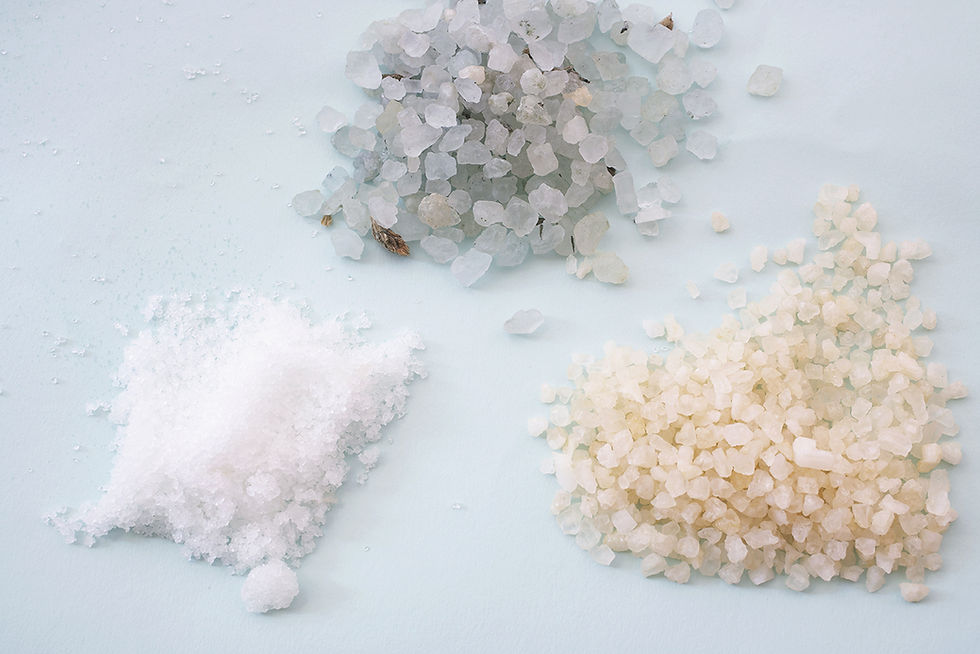
Feeling stressed, run-down, and tired? Need some serious self-care? No worries, I've got just the thing for you. If you're feeling like you've been hit by a truck, take a break and immerse yourself in a warm, soothing Epsom salt bath. Trust me, you'll thank me later.
As cliché as it sounds, Epsom salt baths are your friend in times of stress. Don't believe me; well, continue reading this post to learn a thing or two you didn't know about this superpower mineral.

Epsom salts are one of those things I always keep on hand when I'm travelling or feeling depleted of my physical energy. They are a great way to relax and unwind after a long day. The warm water and the soothing properties of the Epsom salt always leave me feeling refreshed and rejuvenated.

Epsom Salts have been around probably since the beginning of time and have been used for centuries to relieve all kinds of physical pains, aches, and discomforts. It's a good magnesium source with many beneficial household, beauty, and health uses.

Research shows that many people lack this essential mineral due to the decline in magnesium levels in our food and environment. However, using some Epsom salt around the house and in beauty treatments is one easy way to improve magnesium levels.

As with most things in health, science is constantly evolving, so there aren't many studies to back this one up.
So what are Epsom salts exactly?
These unsung heroes of relaxation, Epsom salts, are unique crystals that, when dissolved in your bathwater, work their magic by helping your body absorb much-needed magnesium.

Despite the name, Epsom salt isn't like Himalayan salt or the regular table salt you put on your food. It's a salt because it's a chemical compound (magnesium sulphate heptahydrate). In particular, Epsom salts derives its name from an old English town unearthed in the early 17th century, from a natural underground spring in the village of Epsom in Surrey, England. Unlike table salt, primarily sodium chloride, and Himalayan salt, a type of rock salt, Epsom salt is rich in magnesium. This mineral is essential for many bodily functions.

Thankfully, in today's time, accessing this magnificent compound doesn't require a trip to England. You can find a big, old bag in most drug and beauty stores or grocery and natural food stores for little to nothing (typically starting from $8 CDN). This accessibility puts the power of stress relief and wellness in your hands.

While there are plenty of folk remedy claims, rest assured that taking this bath probably won't hurt you; if you have health concerns, check with your doctor before attempting a soak. There have been claims that soaking in Epsom salts raises blood pressure. So, to be safe, I would check in with your MD if you have concerns. Additionally, it's important to note that Epsom salt baths may not be suitable for everyone. Avoiding Epsom salt baths is best if you have open wounds, burns, or skin infections. Similarly, if you have kidney problems or are on certain medications, such as diuretics or anticoagulants, you should consult your doctor before using Epsom salt baths.

Magnesium is critical in producing energy in cells, helping us feel invigorated without causing restlessness or anxiety. In water, Epsom salts crumble down into magnesium and sulphate. Then, as you soak your body or feet, the magnesium ions break apart from the Epsom salt molecules to relieve muscle tension and stress by promoting serotonin production and reducing adrenaline. The theory is that when you soak in an Epsom salt bath, these get into your body through your skin. This theory has yet to be proven. However, studies have shown that just soaking in warm water alone can help relax muscles; however, the idea is that Epsom salts absorbed through the skin also ease muscle tension, pain, and inflammation in joints, alongside tired and sore feet. Imagine the potential relief and relaxation you could experience with a simple Epsom salt bath.

In addition to relieving stress, discomfort, and pain, magnesium sulphate has several other valuable effects on the human body. It aids in many enzymatic functions, can help regulate fluid retention in cells, and facilitates the body's use of calcium to transmit chemical signals throughout the nervous system. For example, Epsom salt baths benefit people with arthritis, as the magnesium in the salt can help reduce inflammation and relieve pain. Similarly, Epsom salt baths can help improve sleep quality, as magnesium can help relax the muscles and promote a sense of calm.
According to WebMD, People seek to use Epsom salts to help alleviate the following.

Arthritis pain and swelling
Bruises and sprains
Fibromyalgia, a condition that makes your muscles, ligaments, and tendons hurt and causes tender points throughout your body
Ingrown toenails
Insomnia
Psoriasis, a disease that causes red, itchy, scaly skin
Sore muscles after working out
Soreness from diarrhea during chemotherapy
Sunburn pain and redness
Tired, swollen feet

In conclusion, I hope this post found you well and was informative. Trust me when I say that Epsom salts are the bomb.com (especially after physio or an excellent workout). I recommend that those of you who have read this post all the way through dedicate one tonight or this evening to take a candlelit Epsom salt bubble bath or foot soak. And don't forget to share your experience in the comments below! Imagine the potential relief and relaxation you could experience with a simple Epsom salt bath.
If you decide to try an Epsom salt bath, I would love to hear about your experience. Your feedback is valuable and can help others in our community. So, please comment below and share your thoughts. I am eager to know.
Until next time, take care!
Citations
13 Reasons Why Epsom Salt Should Be In Every Home - GARDENIA. https://gardeniaworld.com/index.php/2019/11/07/13-reasons-why-epsom-salt-should-be-in-every-home/
Epsom Salt Bath: How to Take One, What It Does. https://www.webmd.com/a-to-z-guides/epsom-salt-bath

Comments